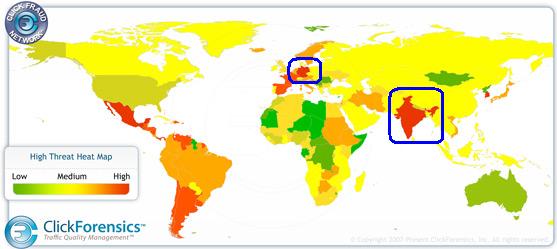A recent study by Clickforensics revealed that the Click fraud phenomenon showed a hike of 15% this year compared to the last year. Not only the increase, but the trend too is alarming.
Apparently, this type of a cyber fraud can be found all over the world but in some countries it is rampant. India ranks at number one by contributing 4.3 percent, followed by Germany with 3.9 percent and South Korea with 3.7 percent, as the Clickforensics study reveals.

Apparently, there are adverts appearing in the classified sections of Indian newspapers with work from home job offers, “Got a PC and Internet connection? Earn Rs. 1,000 /day!,†and more like these.
“With her baby on her lap, Maya Sharma (name changed) gets down to work every evening from her eighth-floor flat at Vasant Vihar,†narrated a Times of India story. “Maya’s job is to click on online advertisements. She doesn’t care about the ads, but diligently keeps count – it’s $0.18 to $0.25 per click.â€
Nearly every click out of three on Google or Yahoo ad is fraudulent. Although there are efforts by most search engine marketing companies which make use of a time-limit filter between clicks, considering the large number of surfers who browse the Internet from offices, which are normally centered around a single IP block, there’s more ice beneath, than on the top of the iceberg.




